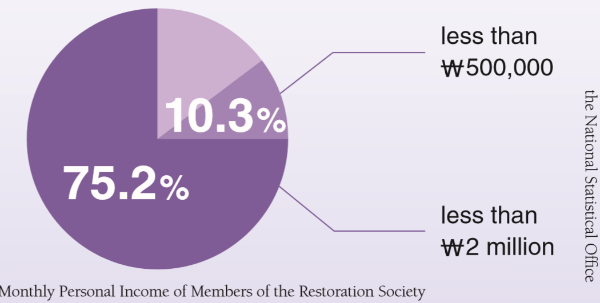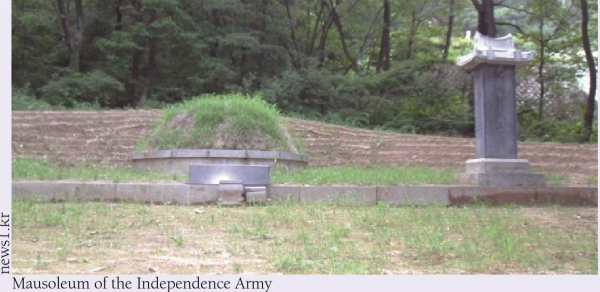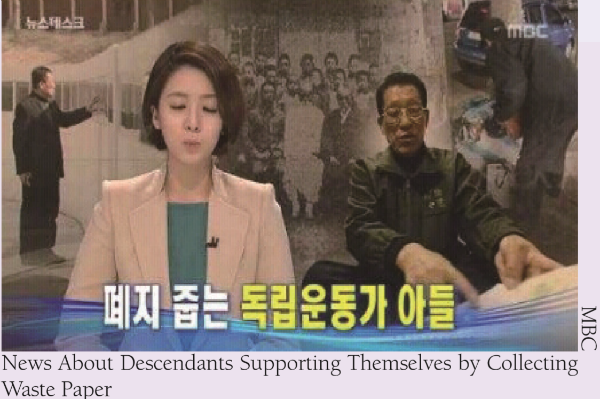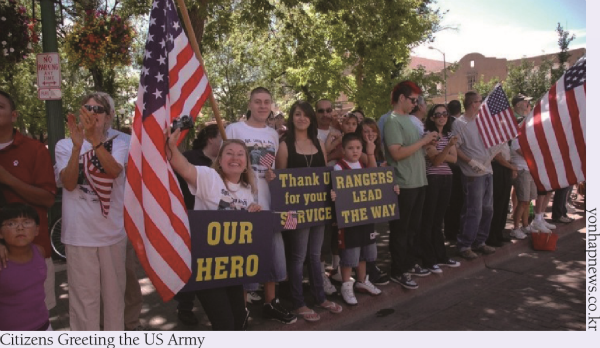November 17 th is the day of Patriotic Martyrs. In 1939, the Provisional Government of the Republic of Korea designated November 17 th as a day for patriotic martyrs to honor the deaths of Korean martyrs such as Yu Gwan-soon, Ahn Joong-geun, and Han Yong-woon. As modern Korea was built on its independence, many people are considered national honorees for sacrificing their lives for Korea. A lot of these national honorees and their descendants, however, are now living in the shadows, being forgotten by the government. The Sungkyun Times (SKT) now informs Kingos of the definition of national honoree, the way they are being treated, and what should be done to move forward.
About National Honorees
National Honorees in Korea
National honoree refers to a person who contributed and sacrificed to protect one’s country or died during their duties. In the case of Korea, national honoree has various classifications. For example, there are patriotic martyrs who protested against the Japanese, supporting the independence movement in Korea and abroad until the country’s complete liberation. Furthermore, there are soldiers who were injured or died during battles or military affairs.
Compensation for National Honorees and the Reality
Currently, post-compensation for national honorees is regulated by the Act on the Honorable Treatment and Support of Persons, etc., of Distinguished Service to the State. According to the act, if a national honoree is officially recognized as a qualified person, the individual can receive compensation after an application process. Compensation differs according to different standards which were set by the Ministry of Patriots and Veterans Affairs. National honorees are given not only financial support such as pensions, but also the honor to be buried in the National Cemetery with benefits for military service and college entrance granted to their sons and daughters. Moreover, support even reaches their descendants up to three generations, including those who live abroad.
Benefits given to national honorees, however, are not that practical. In response to the 70th anniversary of the independence of Korea in 2015, the National Statistical Office (NSO) surveyed 1,000 members of the Restoration Society. 75.2% of the respondents answered that their monthly personal income was less than ₩2 million, and more than 10% responded that their individual monthly income was less than ₩500,000. Furthermore, the majority of national honorees have to go to the hospital regularly due to injuries related to the aftermath of war and mental traumas. Therefore, national honorees, who are usually elderly or unaccompanied by any family members, have difficulties paying hospital bills. As these problems continue, hardship of life expenses are often passed down to the descendants.

Poor Treatments Towards National Honorees
Neglected Mausoleums
There are many neglected mausoleums belonging to national honorees. The problem is that the mausoleums are not being properly managed. The Mausoleum of the Independence Army located at Bukhan Mountain is a perfect example. At the Mausoleum of the Independence Army, there are 17 independence armies who fought against the Imperial Japanese Army in each region of China. This mausoleum is not only located in a desolate area, but burial mounds at the mausoleum are so small that they only show the names of the various armies. The ward office responsible for the mausoleum claims that as there are no descendants to manage the mausoleum, there are no designated workers to protect it. A private organization composed of 37 members of national honorees’ descendants and the bereaved are now trying to care for the neglected mausoleums and to register the mausoleums as cultural assets. Nevertheless, most of the members are in their 90s and thus, only five of them can actively participate in the movement. The issue regarding management of neglected mausoleums, therefore, needs official aid from the government.

Shortage of Support
Currently, the bare minimum support given to basic livelihood security recipients is ₩670,000, while compensation for a national honoree is only ₩510,000. This shows that the treatment for a national honoree does not even reach the level of basic livelihood security recipients. In addition, it is impossible to get both the bare minimum support for basic life insurance and the compensation for a natinoal honoree. Choi Hee-chul, a Vietnam War veteran, became a basic livelihood security recipient due to his poverty, but as he has been designated as a national honoree and has been receiving compensation for that, he had to decide whether he would be a basic livelihood security recipient or a national honoree. In fact, once an individual is designated as a national honoree, he or she cannot cancel it, therefore his choice was not voluntary. For this reason, he received ₩510,000 even though he could have received ₩670,000 due to an institutional defect. Although most national honorees suffer from financial problems, there are more than 20,000 people forced to choose between being a national honoree or a basic livelihood security recipient. In addition to economic support, there is a shortage of support systems helping national honorees to return to society. When it comes to the difficulty of resocialization, national honorees will be in a low income status for a long time, and this will also affect their descendants’ lives. Regarding this situation, some argue that the Independence Movement destroyed their family for three generations. These days, it is common that some descendants of national honorees support themselves by collecting waste paper. Six out of 10 independence activists’ descendants are living in such poor conditions, that they are barely educated. Some of the descendants are receiving compensation from the government such as college entrance benefits, but these types of compensation do not help them practically.
Low Level of Awareness
In Korea, the a w a r e n e s s of national honorees is not that high. In other words, people do not regard them as important. This can be shown in the case of the Korean War Veteran Seo Jung-yeol, who was designated as a national honoree. If one is designated as a national honoree, he or she can use public transportation free with a certain certificate. Thus, veterans are supposed to be able to take the bus for free, after showing their certificate to the bus driver. The bus driver, however, refused to give a ride to Seo as a national honoree, insisting that the bus company he works for does not allow free rides. Moreover, the passengers on the bus including the bus, driver, mocked him by stating that he was making a big deal out of the past. In addition to this case, some students asked him how many people he killed during the war. The students did not show any respect, appreciation or courtesy toward him even though he is a national honoree.

Future Directions for National Honorees
What Should Be Changed?
1) Increase in Financial Support
One of the most fundamental problems that national honorees suffer from is a lack of financial support. Economic poverty can also set limits in professions. As they are mainly struggling with basic living costs, they focus on earning more money to escape from poverty. Since this lifestyle continues long term, their academic ability will be neglected, leading them to having limits in choosing jobs because people still put a high value on academic ability in Korea. Eventually, there is a high probability that this poverty will be passed down to their descendants. In fact, many national honorees are living in difficult financial situations as mentioned above, so it is necessary to enforce financial compensation for them.
2) Support for Resocialization
The lack of support toward resocialization has led to a vicious cycle. Although employment education is being provided to national honorees and their descendants, the people who can actually receive it is limited. Those who can get employment education are limited to 6.25 veterans, their spouses, and children. Furthermore, there are soldiers who were injured or died during battles or military affairs, but they have to be highly ranked in order to get educational opportunities. In Germany, Denmark, and the United States (US), rehabilitation training and employment education programs are being conducted at a relatively wide range compared to Korea. In France, in particular, employers are obliged to set up mandatory employment regulations to ensure employment of all national honorees. Moreover, psychological therapy is conducted at the national level to help them to readjust into normal society. Likewise, it is necessary for Korea to extend the range of national honorees who are qualified for employment education, and to help their resocialization efforts so that they can be free from painful mental problems.
3) Psychological Compensation
Many Korean national honorees think that they have devoted their lives to save the country for nothing. This notion may show that the psychological compensation for them is lacking. In other countries, awareness toward national honorees is also higher. The US, for example, expresses gratitude and gives respect to veterans and even appreciates soldiers even who have passed on. In France, names of national honorees are embedded in various places such as streets, parks and plazas throughout the country to honor their sacrifices. From now on, Korea should also create a society where these heroes can be properly honored for their sacrifices and where citizens respect and properly appreciate their feats.

Current Efforts Being Made
Since the establishment of a new government, Korea has also made progress in matching the precedent set by other developed countries. Government officials attended ceremonies to honor national honorees of the Gwangju Student Independence Movement this year and announced future improvements of the treatment of them and their descendants. Moreover, the government stated that the belief that the independence movement destroyed their family for three generations should disappear and that there is a need for a systematic support program. In addition, in the commemoration of the 72nd anniversary of the Independence of Korea, the government deliberated the revision bill of the Act on the Honorable Treatment and Support of Persons, etc., of Distinguished Service to the State. These efforts are meaningful in that specific directions for improving the treatment of national honorees and their descendants have been presented.
Many historians say that there is no other country like Korea where mausoleums of national honorees are neglected and where national honorees themselves, along with their descendants, live in conditions worse than basic livelihood security recipients of welfare. Although it is necessary to make various institutional improvements, the most important thing is a change of awareness. People should not just give them a temporary surge of interest on the day honoring them or when movies about them are released. Rather a society where people sincerely express gratitude and respect for these heroes should be fostered and encouraged.
